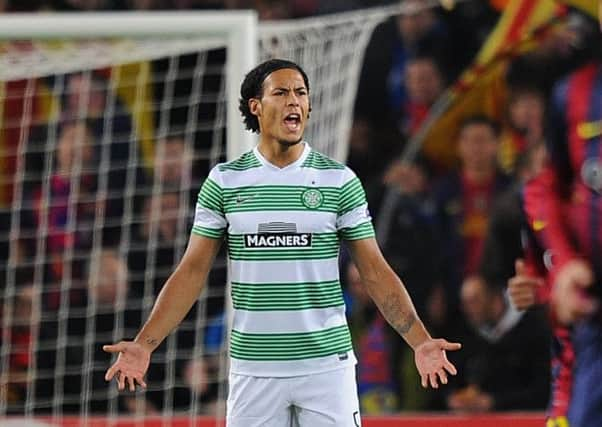Glenn Gibbons: No room for softie Celtic in Europe


The Champions League is the playground of hard cases, with no room for easily-bullied softies.
The ferocity of Lennon’s after-match invective towards his players amounted to a public flaying of their kittenish character and an undisguised demonstration of his sense of personal betrayal. The distinguished football writer, Kevin McCarra, once wrote that no manager draws up a team selection without producing a self-portrait; Lennon’s representatives at Camp Nou took a razor to the canvas.
Advertisement
Hide AdAdvertisement
Hide AdThe Irishman would be deeply insulted by a group whose timidity and vulnerability were a perversion of his own conviction, commitment and will as a player. It is difficult to imagine that he would not also have been tormented by guilt, reflecting his own part in the acquisition, preparation and selection of so many who have proved to be paper tigers.
Even if there had been a growing awareness of the Scottish champions’ frailties through the preceding defeats by Ajax and Milan in Group H, the accompanying relative ordinariness of their rivals, including Barcelona, would have left very few people prepared for the calamity of the final fixture.
But it is surely of huge significance that Lennon and his coaching staff should have been discomforted – perhaps even alarmed – by the unmistakable impression of apprehension among their players even before the match kicked off. This carries the strong suggestion of a team susceptible to a dangerous uncertainty.
More worryingly, it hints at a condition that may be incurable. Celtic’s present domination of the domestic game virtually ensures their pre-eminence for the foreseeable future, including annual tilts at the Champions League. Thanks to the champions’ route devised by the Uefa president, Michel Platini, the Parkhead side are likely to continue to have a favourites’ chance of qualifying for the group stage.
But, as long as their progress is dependent on the kind of shrinking violets who capitulated so meekly to Barcelona, reaching the tournament proper will have to remain the limit of the dream. Those who predicted, however, that the return of Scott Brown would make all the difference may draw satisfaction from being proved right; a 1-0 defeat by Barca in his absence in Glasgow turned into a 6-1 thumping on his reappearance in Spain – quite a difference, indeed.
While Lennon should (and almost certainly will) accept a measure of culpability in the matter of judging his recruits’ lack of steel – it should also be recognised that financial imperatives bring the need to shop at the car boot sale rather than the fashion house.
In this regard, there have been predictably mixed results, with successes such as Gary Hooper, Victor Wanyama, Virgil van Dijk and the promising (if sometimes immature and erratic) Efe Ambrose offset by more conspicuous duds.
A continuing mystery is the widespread tendency among pundits to include the thoroughly moderate Kelvin Wilson along with Hooper and Wanyama as an example of Celtic selling their best players. The Nottingham Forest-bound central defender has been replaced by the notably superior Van Dijk.
Advertisement
Hide AdAdvertisement
Hide AdNor is there a case to be made for the Celtic board’s desertion of their policy of economic prudence, even at the cost of the kind of embarrassment suffered on Wednesday. An on-field thrashing is, by any measure, less hurtful and more recoverable than insolvency.
Rangers fans hardly spoilt for choice
Assessing the fall-out from an election campaign ahead of Rangers shareholders’ agm on Thursday that always seemed certain to be messy, it is impossible to avoid the impression that, in the search for a repository for their allegiance, Rangers fans are caught between the devil and the deep blue sea.
A board of directors-in-residence that is, by and large, so recently formed as to have had little opportunity to demonstrate its effectiveness is, nevertheless, tainted by association with predecessors of spectacular under-achievement and personal over-enrichment.
There appears to exist among a substantial number of the Ibrox club’s followers a conviction that the very willingness of David Somers (chairman), Graham Wallace (chief executive) and Norman Crichton (non-executive director) to be associated with the habitually criticised finance director, Brian Stockbridge, is sufficient to question their bona fides.
But the challengers to the established order, in the shape of the Paul Murray-led consortium that also includes former chairman Malcolm Murray, Scott Murdoch and Alex Wilson, could hardly be said to enjoy unconditional acclaim the length and breadth of the fan base.
The two Murrays are themselves the bearers of a stigma, the legacy of their time on the board of the oldco that entered administration and is now going through the formal process of liquidation. Their credentials are smeared by the fact of their having been members of the board which allowed Rangers to slip from their control and into the clutches of the administrators.
Supporters groups, ranging from the Assembly through the Association and the Trust to the newly-constituted Sons of Struth, have been vociferous contributors to the debate, but their influence is extremely limited, with “ordinary” fans holding a reported 10 per cent of the equity. Even then, there is no figure available which reveals how many of them are even affiliated to any of the groups, far less which way they will jump. Given the general uncertainty among the interested parties, the supporter/shareholder vote could well be split and, as a consequence, diluted to the point of irrelevance.
The situation is reminiscent of a famous manager who once confided his rating of a particular player: “If it was a two-horse race, he’d be my third pick.”